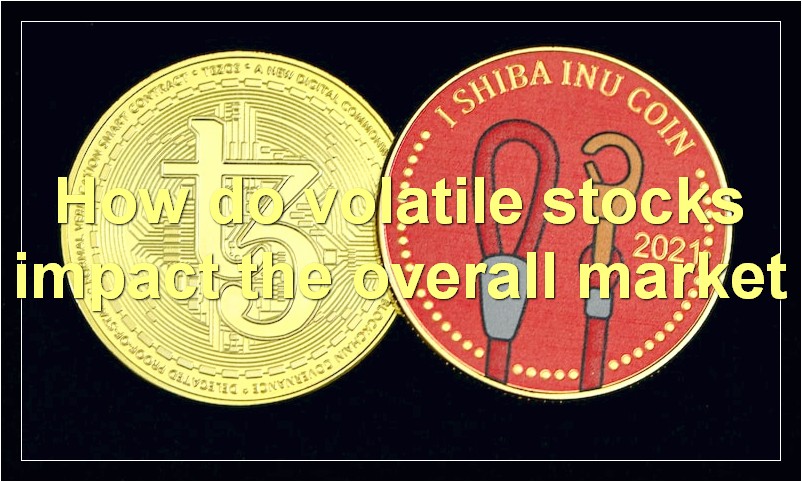If you’re looking to make a quick buck, investing in volatile stocks is the way to go. But what exactly are volatile stocks? And how can you profit from them? Here’s everything you need to know.
What are the most volatile stocks
Volatile stocks are those that experience large price swings over a short period of time. They can be riskier investments than more stable stocks, but they can also offer greater potential rewards.
There are many factors that can contribute to a stock’s volatility, including news events, earnings reports, and changes in the overall market. While it can be difficult to predict which stocks will be volatile at any given time, there are certain sectors that tend to be more volatile than others.
Some of the most volatile stocks in recent years have been in the tech sector, as companies like Amazon (AMZN) and Tesla (TSLA) have seen their share prices fluctuate wildly. Other volatile stocks have come from the energy sector, as oil prices have fluctuated greatly in recent years.
While volatile stocks can be risky, they can also offer investors the opportunity to make significant profits if they are able to correctly predict which way the stock will move. For investors who are willing to take on more risk, volatile stocks can be a great way to boost returns.
What factors make a stock more volatile

Volatility is a measure of how much a stock price fluctuates over time. It is calculated by taking the standard deviation of the stock’s return over a certain period of time. The higher the volatility, the greater the fluctuations in the stock price.
There are a number of factors that can make a stock more volatile. One is the company’s financial condition. If a company is in poor financial condition, its stock is likely to be more volatile. Another factor is the industry in which the company operates. Some industries are more volatile than others. For example, the technology sector is typically more volatile than the healthcare sector.
Another factor that can impact volatility is news about the company. If there is positive news about the company, such as a new product launch, this can lead to an increase in the stock price. However, if there is negative news, such as a lawsuit or disappointing earnings, this can lead to a decrease in the stock price.
Finally, market conditions can also impact volatility. If the overall market is experiencing high volatility, individual stocks will tend to be more volatile as well. This is because investors are generally more risk-averse during periods of market turbulence and are therefore more likely to sell off their holdings of volatile stocks.
How can investors profit from volatile stocks
In recent years, volatile stocks have become increasingly popular among investors. While the risks associated with these types of investments are higher, the potential rewards are also greater. For investors looking to profit from volatile stocks, there are a few strategies that can be used.
One strategy is to buy stocks when they are down and then sell them when they rebound. This can be difficult to do, as timing the market is often difficult. However, if an investor is able to successfully buy low and sell high, they can make a significant profit. Another strategy is to short sell volatile stocks. This involves selling a stock you do not own and then buying it back at a lower price.
While there are risks associated with investing in volatile stocks, there are also great rewards. By using the right strategy, investors can profit from these types of investments.
What risks are associated with investing in volatile stocks
Volatile stocks are those that can fluctuate greatly in price over a short period of time. While these stocks may offer the potential for high returns, they also come with a higher level of risk. Some of the risks associated with investing in volatile stocks include:
-The stock price may drop significantly, leading to a loss on your investment.
-The company may go bankrupt, leaving you with nothing.
-You may be unable to sell the stock when you want to, as there may not be enough buyers.
-Other investors may be able to sell their shares for a much higher price than you paid, leading to envy and regret.
Before investing in any stock, it’s important to research the company and understand the risks involved. Volatile stocks can be a high-risk, high-reward investment, but they’re not right for everyone.
What are the most volatile sectors
The most volatile sectors are those that experience the greatest changes in prices. This can be due to a variety of factors, including changes in supply and demand, geopolitical factors, and economic conditions. The most volatile sectors can be found in industries such as energy, commodities, and financial markets.
How do volatile stocks impact the overall market

Volatile stocks are stocks that tend to fluctuate rapidly in price. They can have a big impact on the overall market for a number of reasons.
For one, volatile stocks tend to be more heavily traded than stocks that don’t fluctuate much in price. This means that when there is a lot of buying or selling going on with volatile stocks, it can have an effect on the prices of other stocks as well.
Another reason why volatile stocks can impact the overall market is because they can be used as a barometer for investor sentiment. When volatile stocks are doing well, it usually means that investors are feeling confident about the market and are willing to take on more risk. On the other hand, when volatile stocks are struggling, it can signal that investors are becoming more cautious and may start selling other assets as well.
Finally, volatile stocks can also have an indirect impact on the market by affecting the psychology of investors. When prices are constantly moving up and down, it can create a sense of uncertainty which can lead to more conservative decision-making by investors. This can ultimately help to cool down an overheated market or make a bear market more manageable.
While volatile stocks can be a source of anxiety for some investors, it’s important to remember that they can also provide valuable information about the market and its underlying conditions. As such, they should be watched closely by all investors.
What is the difference between volatile and non-volatile stocks
Volatile stocks are those that can go up or down in price very quickly, while non-volatile stocks are those that tend to stay about the same over time. Many people prefer to invest in volatile stocks because they have the potential to make a lot of money if they go up in price, but they can also lose a lot of money if they go down. Non-volatile stocks are generally seen as safer investments, but they also tend to provide lower returns.
Are volatile stocks more risky
Volatile stocks are more risky than stable stocks. This is because volatile stocks are more likely to go up and down in value, which means that there is a higher chance that you will lose money if you invest in them. However, volatile stocks also have the potential to make you a lot of money if they rise in value, so it is important to weigh the risks and rewards before investing in any stock.
Should investors avoid volatile stocks
In short, yes.
Volatile stocks are defined as those that experience large swings in price over a short period of time. They can be very risky investments, and can often lead to big losses.
There are a few reasons why investors should avoid volatile stocks. First, they tend to be much more risky than other types of stocks. This means that there’s a greater chance that you could lose money if you invest in them.
Second, volatile stocks can be very difficult to predict. Even the most experienced investors can have trouble figuring out which way these stocks will go. This makes it hard to make money off of them.
Finally, volatile stocks tend to be much more expensive than other types of stocks. This means that you’ll likely have to pay more for them, and you may not get as good of a return on your investment.
Overall, volatile stocks are best avoided by most investors. If you do decide to invest in them, make sure that you’re prepared for the risks involved.
What are some strategies for managing volatile stocks
Volatile stocks are those that move up or down sharply in price over short periods of time. They can be riskier investments than more stable stocks, but they can also offer greater rewards.
There are a few different strategies investors can use to manage volatile stocks. One is to buy them when they are low and sell them when they are high. Another is to hold onto them for the long term and ride out the ups and downs.
Some investors also use stop-loss orders, which automatically sell a stock when it reaches a certain price. This can help limit losses if the stock price falls sharply.
Whatever strategy you use, it’s important to do your research and understand the risks involved before investing in any stock, volatile or not.

